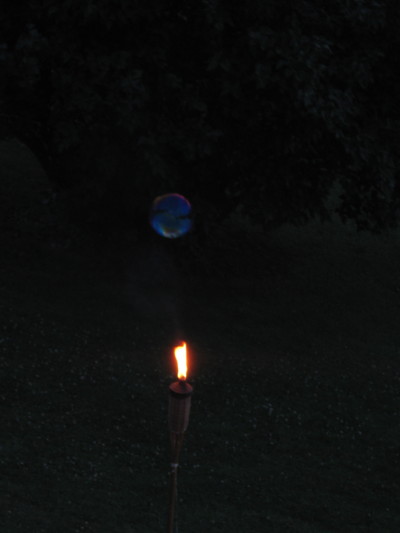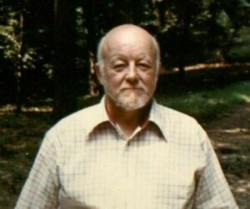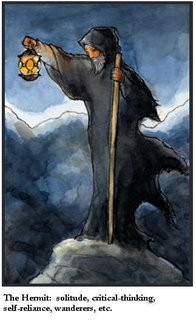September 2009
This Month's Contents: The Quotable Rose: Ten One-Liners That Speak Volumes by Bart Marshall | Ponder this by Joseph Campbell | A Poem by Shawn Pethel | Observations by Shawn Nevins | Humor |
Editor's Note
by David Weimer
 What do we know for sure?
What do we know for sure?
Our lives are very short. Time blows by when we're not looking and we're like a bubble being blown in the breeze.
"Everything you love will be taken away from you." This quote has stuck with me since I first heard it, and probably not for the obvious reason. I think it goes much further than that.
We're going to be taken away—from ourselves and from everything. And we don't know when it will happen. I think it's worth taking time in this lifetime to find out what existence is: To know for sure.
Encountering Richard Rose and the members of TAT has allowed me to spend time talking with others on this subject. I'm grateful for the company!
I hope you enjoy this month's Forum.
As always, your preferably original submissions are welcome. Please use the contact tab at the top of this page.
The Quotable Rose: Ten One-Liners That Speak Volumes
by Bart Marshall
[A talk given at the April 2009 TAT conference]
Whenever I talk about spiritual matters, sooner or later I hear myself quoting Richard Rose or recommending something I learned from him. When it came to the business of finding Truth, there's nothing Rose hadn't thought through and found words for. He also had a knack for encapsulating key spiritual strategies into short, memorable phrases that tend to lodge in your mind.
This morning I'd like to talk about ten of those key strategies that I think together express the essence of Rose's teachings in a total of maybe fifty words, all of them aimed at one thing—lighting a path to the Absolute.
As it happens, these strategies are also useful in daily life to get most anything you want, but that's not their intention. Rose had no interest in helping people live more comfortable lives or become better robots. People who came to him looking for those sorts of things usually didn't stay long. Rose's core teachings are directed at people who at least suspect that their basic problem can never be solved on the level of the problem, and that a great leap is in order.
 Rose's teachings are based on the premise that extreme spiritual effort is our
best shot at enlightenment. But he also cautioned that "There's no recipe for a
lightning bolt." In other words, there is no direct cause and effect relationship
between your efforts and enlightenment, should it occur.
Rose's teachings are based on the premise that extreme spiritual effort is our
best shot at enlightenment. But he also cautioned that "There's no recipe for a
lightning bolt." In other words, there is no direct cause and effect relationship
between your efforts and enlightenment, should it occur.
Which begs the question, "So why exert any effort?" Well, because statistics show it somehow increases your odds. Yes, it's true that there's no one here to do any seeking, and that no effort is required to be that which you already are. You are most definitely already and always that which you seek. That's the absolute Truth. But a fat lot of good it does you if you don't know it.
The hard facts are that almost every incidence of Realization has occurred to someone who actively worked and prayed for it over a period of years—sometimes a whole lot of years. The mechanism at work is a mystery, but the pattern is observable so if we're serious about this enlightenment thing, it seems like a good idea to plug into it. As Rose said, "Enlightenment is always an accident, but there's ways to become more accident prone."
So the recommendations we'll talk about this morning are by no means a recipe for a lightning bolt, but they may help you become more accident prone.
I debated how to organize this, and ended up deciding to fabricate a little suspense by going with the Letterman "Top 10" format, even though the numbers I've assigned are virtually meaningless.
None of these strategies is inherently more important or powerful than any other, and none is a prerequisite for anything else. In fact, if you investigate any of them deeply enough, you'll find that each includes or implies all the others—as well as twenty other Rose sayings we could have included. There's really only one strategy.
I'll try not to spend too much time on my prepared remarks because I think the best stuff often comes out in the discussions afterwards, but I want to say enough to spark some questions, then we can go deeper into the parts that interest you.
Okay, enough caveats. Here we go: "Richard Rose's Top Ten Tips for Serious Seekers."
Ponder this
|
...Schopenhauer, in his bold and really magnificent "Transcendent Speculation upon an Apparent Intention in the Fate of the Individual" (1850), takes up the idea, remarking that in the later years of a lifetime, looking back over the course of one's days and noticing how encounters and events that appeared at the time to be accidental became the crucial structuring features of an unintended lifestory through which the potentialities of one's character were fostered to fulfillment, one may find it difficult to resist the notion of the course of one's biography as comparable to that of a cleverly constructed novel, wondering who the author of the surprising plot can have been; considering further, that as the shaping of one's own life was largely an effect of personalities accidentally encountered, so, too, one must oneself have worked effects upon others. The whole context of world history, in fact, is of destinies unfolding through time as a vast net of reciprocal influences of this kind, which not only are of people upon people, but involve also the natural world with its creatures and accidents of all kinds. Invoking the analogy of dream, the philosopher reminds his reader that in dream the unanticipated occurrences, which appear to be accidental and occasionally, as in nightmare, terrifying, are actually of a context composed and controlled according to an unsuspected intention which is of none other than one's own will, "put forward from a standpoint, however, that is not of the dreaming consciousness." Comparably, the dream or nightmare of our lives is a production of our own hidden will. But the dreams and lives of all interlock, as though of a single, superordinated context; "so that," as the philosopher observes, "in the way of a veritable Harmonia praestabiliter, each dreams only to accord with his own metaphysical associations, yet all the life-dreams are interlocked so artfully that each, though experiencing only what is profitable to himself, is yet fulfilling the requirements of others…. "Our hesitation before such a colossal thought will perhaps be diminished by the recollection," Schopenhauer suggests in conclusion, "that the ultimate dreamer of the vast life-dream is finally, in a certain sense, but one, namely the Will to Live, and that the multiplicity of appearances follows from the conditioning effects of time and space [the morphogenetic field whereby the Will to Live assumes forms]. It is one great dream dreamed by a single Being, but in such a way that all the dream characters dream too. Hence, everything links and accords with everything else." The Indian image of the "Net of Gems," where in every gem of the net all the others are reflected, is a counterpart of this idea. ~ Joseph Campbell - 1986, The Inner Reaches of Outer Space; Metaphor as Myth and as Religion (pp. 110-111), Harper & Row, Publishers, Inc. |
A Meditation on the Illusion of Individuality
by Shawn Pethel
|
The sky hugs the earth The earth replies with limbs and leaves Drawing the sky into the ground And subterranean water into the air Life is a momentary eddy In the endless upheaval of matter From one place to another Through boundary-less boundaries An immense flow Of featureless particles Each only a ripple In a seamless sea of energy
|
Observations• Sooner or later we all give our lives up to someone else. • The only way this moment will last is without you. • The world laughs with you when you laugh at yourself. • Any description of your self is a smoke screen. • We have infinite power within us, which goes by many names, but the one name it does not go by is our own. • A balanced life is for those afraid to fall or fly. • Space allows us to welcome rather than reject the unexpected. • Conversation is at its best improvisation: a storm of improbabilities as two minds step into one another – doubling their speed and distance. • Nostalgia is the observer in action, time suspended, the golden glow of the past that is actually available now. • You have to put some motion behind your notion. • Growing old gracefully means not to bother the young with your problems.
~ Encounter more of Shawn Nevins' thoughts and verse at his pages on Poetry Chaikhana |
Humor.... |
Reader Commentary
I found the piece on Mirror Therapy (Aug 2009 issue) very interesting, especially the notion that "phantom limb" pain can be likened to any kind of suffering caused by a lack of something—like social acceptance or even a life fully lived. The idea of tricking the brain into this fuller perception by reflecting images of what's missing—and therefore somehow healing the hurt—is fascinating. Seems like this therapy can be extended to all sorts of situations where one feels the pain of "missing limbs." Thanks to Art Ticknor and the TAT Forum for his article. ~ S.C.
Did you enjoy the Forum? Then buy the book!
Beyond Mind, Beyond Death
is available at Amazon.com.



